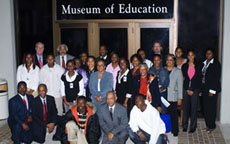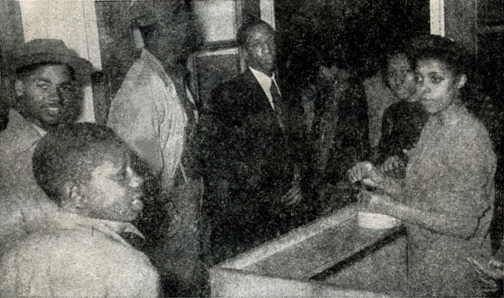| |
|
Booker T. Washington
High School Teachers |
|
| |
|
|
|
| |
|
|
|
|
While not all of the teachers at Booker T. Washington High School were convinced of the importance of progressive education, the staff clearly attended to issues that were commonly addressed among progressive schools of the 1930s and 1940s. Core curriculum and the determination of student needs served as regularly discussed topic for Principal Pope and the teachers. The use of a free reading, "nature of proof"—core mathematics program, and the focus on democracy places the high school directly within the experimental tradition established by the Progressive Education Association's Eight Year Study. |
|
|
|
|
|
|
|
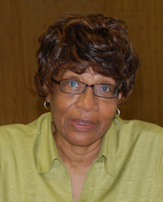
Mary Perry
"School was a special place that was made dynamic by the teachers. Students wanted to come to school; we didn’t want to miss anything. We were made to feel part of a community and wanted to be there." Mary Perry
|
|
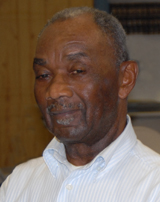
John Perry
"The teachers were a special group, and they were part of our life at home. They knew our parents and they knew us outside of the classroom. They cared for us inside the school and they watched us outside of the classroom—always ready to help. They knew that education began at home." John Perry
|
|
|
|
|
|
|
|
|
|
|
|
| |
|
|
|
|
|
|
|
|
|
|
|
|
|
|
|
|
|
|
| |
from Secondary School Study documents:
“A set of long-term plans formulated by Booker T. Washington School [teachers] is presented below. This sample was selected for its clarity and detail. These and other long-term plans formulated by member schools were a part of their continuous evaluation programs.
The Committee on Long-Term Planning submits the following report for approval by the faculty:
1)
Continuous Professional Improvement of the Staff;
2) A Unified Functional Reading Program;
3) Purposeful Adaptation of Subject Matter;
4) More Democratic Living in the School;
5) Improved Guidance Program;
6) More Adequate Physical Equipment;
7) Contributions Toward Community Growth;
8) A continuous Appraisal of Objectives which may be classified and redefined as we gain insight.
The Secondary School Study can render these following services to our school.
Respectfully submitted: R. Lord, Chair; Wilma Lassiter, Secretary; P. L. Whitley; J. E. Bynum; L. P. Turner
from W. H. Brown & W. A. Robinson,
Serving Negro Schools: A Report on the Secondary School Study (1946)
|
|
| |
|
|
|
|
|
|
|
|
|
|
|
|
|
|
|
|
|
|
| |
|
|
|
|
|
"The teachers kept us together as a group as we had supervised study hours. We were assigned to specific teachers who, as they were teaching, we were with them engaged in our own work. We were all working together—they helped us; we were not fearful of them."
Maggie L. Gilliam
|
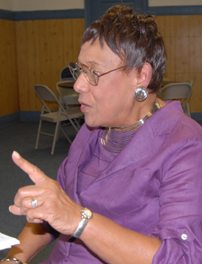
Maggie L. Gilliam
|
|
|
| |
|
|
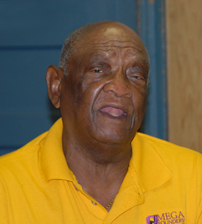
Guion Davis
"The teachers truly cared about us. If I didn’t have my work completed, I would meet with Mrs. Mabel Lenhardt at her house and would stay and work on my assignments. She would feed me just to make certain that I was cared for. The teachers did what they had to do." Guion Davis
|
|
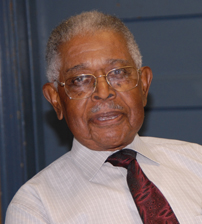
Robert Hines
"The staff of Booker T. Washington High School were interested in the students learning, and if they had to take time on Saturday or at night, they would do so. They were committed to us and knew that they were making a difference and that we would help change society."
Robert Hines |
|
| |
|
|
|
|
|
|
|
|
|
|
|
|
|
|
|
|
|
|
| |
|
from Secondary School Study documents:
A Proposed Scheme for Unifying Mathematics in Booker T. Washington High School:
"[Harold] Fawcett and his students have proposed a scheme by which the mathematics experiences provided for learners in all elementary, high school, and college grades might be unified. The math teachers in Booker T. Washington believe that this idea is sound and have set out to discover how they can promote the growth of students using these concepts as bases for work in all classes. We do not expect to break down immediately the long-established subject matter courses existing in the school. Yet, we are committed to the idea of examining our courses in order to discover the range of opportunities provided for students, and to get and use the proposed concepts. At the same time we want to discover how to convince students that these concepts can be valuable keys to mathematics.
Eventually, we want to have in each math room individual folders for each student holding organized samples of his work on each concept and dated reports of progress which describe gains made by each class and perhaps each individual in understanding and using basic math concepts."
|
|
| |
|
|
|
|
|
|
|
|
|
|
|
|
|
|
|
|
|
|
|
|
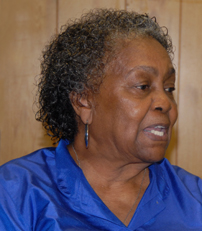 Mary W. Dawson
Mary W. Dawson |
|
"The teachers were so caring. If you were a needy student, Mrs. Pocahontas Whitley found ways to help you. She would send you downtown to buy whatever you needed for the occasion."
Mary W. Dawson |
|
|
|
|
|
|
|
|
|
|
|
|
|
|
|
|
|
|
|
|
|
|
|
|
|
|
|
"Mr. Earl C. Burnett, my biology teacher, taught us with such comprehensiveness. We covered so much content and we learned it—he wanted this from us and we believed in him.”
"Pocahontas L. Whitley was very loving, caring, and compassionate. She always helped students to reach their highest potential, and she provided encouragement as well as monetary help for students during their high school and college years."
Helen Mercer Dixon |
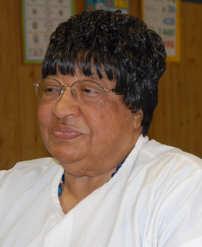
Helen Mercer Dixon |
|
|
|
|
|
|
|
|
|
|
|
|
|
|
|
|
|
|
|
|
|
|
|
|
|
|
|
|
|

return to Secondary School Study home
|
|
|

return to Booker T. Washington
|
|
|
|
|
|
|
|
|
|
|
|
